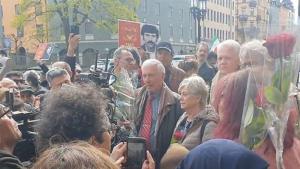Final day of Noury trial in Sweden, verdict to be announced in July
May 11, 2022Human Rights - Social Gov originally published at Human Rights - Social Gov
On May 4, a Stockholm, Sweden, court held the final hearing session of the trial of Hamid Noury, an Iranian regime official involved in the torture and murder of thousands of political prisoners. The court will deliver its final verdict on July 14.
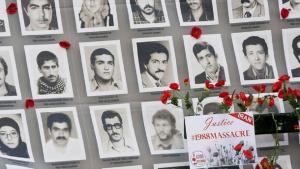
In the summer of 1988, the regime carried out a complete purge of prisons under the orders of mullahs’ regime founder Ruhollah Khomeini, executing more than 30,000 prisons in the span of a few months.
Noury was assistant deputy prosecutor of Gohardasht prison, west of Tehran. He participated in the execution of political prisoners at the facility.
— MEK
PARIS, FRANCE, May 9, 2022 /EINPresswire.com/ — On May 4, a Stockholm, Sweden, court held the final hearing session of the trial of Hamid Noury, an Iranian regime official involved in the torture and murder of thousands of political prisoners. The court will deliver its final verdict on July 14.
In the summer of 1988, the regime carried out a complete purge of prisons under the orders of mullahs’ regime founder Ruhollah Khomeini, executing more than 30,000 prisons in the span of a few months.
Most of the victims were members and supporters of the People’s Mojahedin Organization of Iran (PMOI/MEK).
At the time, Noury was assistant deputy prosecutor of Gohardasht prison, west of Tehran. He actively participated in the execution of political prisoners at the facility.
During the 92 court hearings, many witnesses testified on how Noury and other regime authorities tortured prisoners and took them to a hall where they were hanged in groups.
Swedish prosecutors have requested life in prison sentence for Noury for committing war crimes and murder during the 1988 massacre of Iranian political prisoners. The lawyers of PMOI/MEK plaintiffs have also made a similar request.
Experts expect the court to give the life imprisonment verdict come July.
Freedom-loving Iranians from all over Europe gathered in Stockholm on Wednesday as a continuation of the nine-month-long rally to mark the last day of hearings in the Noury trial.
Many of the demonstrators, mostly supporters of the Iranian opposition PMOI/MEK, have been attending these rallies consistently throughout the past nine months to voice the opinion and demands of the Iranian people to the international community.
This especially includes the prosecution of regime officials involved in human rights violations and crimes against humanity, including regime Supreme Leader Ali Khamenei, current regime President Ebrahim Raisi, and others.
Loved ones who lost their family members in the summer 1988 massacre overcame all obstacles and difficulties to attend these rallies, keeping alive the victims’ memories and continuing to be the voice of not only those who lost their lives during the mass executions of the 1980s and the 1988 massacre across Iran but the innocent Iranians who are being killed a day in and day out by the mullahs’ regime.
In a video message, Mrs. Maryam Rajavi, president-elect of the National Council of Resistance of Iran (NCRI), praised the demonstrators for their restless endeavors “to urge the world to prosecute the mass murderers ruling Iran for their crimes against humanity, war crimes, and genocide.”
Mrs. Rajavi recalled a brief history of the Justice Movement and the efforts of the Iranian Resistance to bring attention to the 1988 massacre in the past three decades.
“I salute everyone who sacrificed and endeavored in this Call for Justice Movement for the past three decades,”
Mrs. Rajavi said. “That includes Prof. Kazem Rajavi and all those who were arrested and tortured for collecting information on the massacre, filing a complaint, or protesting against the regime.
I also salute the PMOI and Marxist prisoners. They gave accurate testimonies with irrefutable details on the 1988 massacre. With a deep sense of responsibility, they thus supplied the essential documents for the Prosecutor’s indictment.”
Mrs. Maryam Rajavi reiterated that the investigation into genocide and crimes against humanity should be extended to all prisons across Iran.
Simultaneously in Ashraf 3, home to the PMOI/MEK members in Albania, a large gathering was held in support of Iran’s Justice Movement and to voice solidarity with the demonstrators in Stockholm.
Several survivors of the 1988 massacre relived their torment and ordeals, recalling the atrocities they had witnessed in various prisons of Iran, and the small number of regime officials involved in determining the fate of each political prisoner through the course of kangaroo courts that would last mere minutes.
PMOI/MEK members in Ashraf 3 voiced their support for the initiative calling on the international community to hold the mullahs’ regime accountable for their gross human rights violations, crimes against humanity, war crimes, and genocide against the Iranian people throughout the past 43 years.
Iran’s 1988 massacre of over 30,000 political prisoners in Iran has been described as one of the worst crimes against humanity since World War II.
A former Iranian Intelligence Ministry deputy recorded a video clip in 2008, in which he revealed that the mullahs’ regime had massacred some 33,700 political prisoners and buried them in mass graves.
According to Reza Malek, there are between 170 to 190 mass graves across the country.
More recently, Geoffrey Robertson, QC, who has thoroughly investigated the 1988 massacre, underscored that this mass killing amounts to “genocide.” “It has been a crime to kill prisoners for centuries.
The difference is that if it amounts to a particular crime of genocide, there is an international convention that binds countries to take action and punish that genocide,” he said in an online conference held in late August.
“It seems to me that there is very strong evidence that this was a genocide. It applies to killing or torturing a certain group for their religious beliefs. A religious group that did not accept the backward ideology of the Iranian regime,” Robertson added referring to Khomeini’s fatwa as the basis of the massacre.
“There is no doubt that there is a case for prosecuting [regime President Ebrahim] Raisi and others.
There has been a crime committed that engages international responsibility. Something must be done about it as has been done against the perpetrators of the Srebrenica massacre,” he reiterated.
Also, on the last day of hearings in Noury’s trial the mullahs’ regime in Iran announced that Iranian-Swedish researcher Ahmadreza Djalali has been sentenced to death and his execution will be carried out on May 21.
This is being viewed by many as Tehran pressuring Stockholm in an effort to influence the fate of Noury and the trial’s process, especially with the judge’s ruling scheduled to be delivered in mid-July.
Swedish Foreign Ann Linde voiced grave concerns regarding the regime’s decision to enforce the death penalty on Djalali, adding Sweden and the European Union “condemn the death penalty and demand that Djalali is released. We have repeatedly stated this to Iranian representatives.”
Back in late 2020, the mullahs’ regime had linked Djalali’s case to that of Assadollah Assadi and three other terrorists of the Iranian Intelligence Ministry (MOIS) convicted for plotting to bomb an annual event of the Iranian opposition coalition National Council of Resistance of Iran (NCRI) in Paris in 2018.
Assadi, a senior Iranian regime diplomat based in Vienna at the time, has been sentenced to 20 years imprisonment. Tehran had threatened to execute Djalali in late 2020 to pressurize Belgian authorities to release Assadi.
After the court ruling of February 4, 2021, Tehran summoned the Belgian ambassador and expressed dissatisfaction.
For Belgium, the conviction of Assadi by a criminal court in Antwerp and the death sentence pronounced by the Iranian regime against Djalali are separate issues, Minister of Foreign Affairs Sophie Wilmès said at a parliamentary committee hearing on Foreign Affairs on March 2, 2021.
As Linde was in Washington, DC, on Wednesday meeting with U.S. officials and politicians involved in foreign policy, U.S. State Department spokesperson Ned Price described the Iranian regime’s handling of Djalali’s dossier as an “egregious case of arbitrary detention.”
Iranian regime Foreign Minister Hossein Amir-Abdolahian had a phone conversation with his Swedish counterpart on Wednesday, during which he said Tehran “considers the detention and trial of Hamid Nouri (in Sweden) as illegal and calls for his immediate release.”
This signals the importance of Noury’s trial for the regime in Iran, knowing such a precedent can lead to similar measures by different countries that have the potential to spread further light on the 1988 massacre and the vast scope of the mullahs’ atrocities against the Iranian people.
Shahin Gobadi
NCRI
+33 6 61 65 32 31
email us here
Most of the victims were members and supporters of the People’s Mojahedin Organization of Iran (PMOI/MEK).
![]()
Human Rights - Social Gov originally published at Human Rights - Social Gov
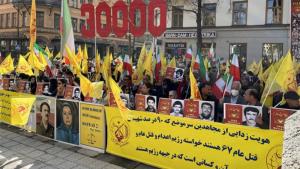
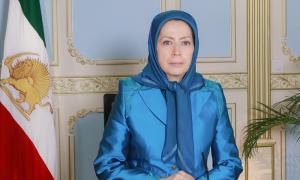
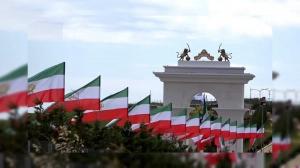
 ,
,
